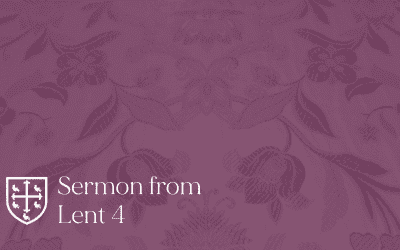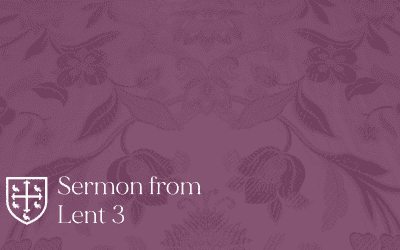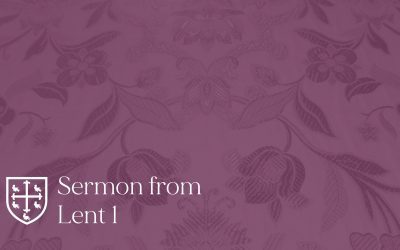Advent 3 Year C 12/15/2024
Zephaniah 3:14-20; Canticle 9; Philippians 4:4-7; Luke 3:7-18
Rev. Mark A. Lafler
Every week…
No matter what season of the church year…
We have four readings of scripture.
Usually, an Old Testament reading…
A Psalm…
A New Testament reading…
And a Gospel reading.
However, today… we didn’t have a psalm.
We had a Canticle…
Canticle 9 to be exact.
A Canticle is a song used in liturgical worship.
They are drawn from biblical texts other than the Psalter.
Our Canticle, Canticle 9, comes from Isaiah 12:2-6.
The term, Canticle is derived from the Latin canticulum,
which means a little song.
Canticles are sung or said in worship.
You can find all the different Canticles in the office of Morning Prayer in our Prayer Book.
And they are used at various times throughout our worship in the Anglican Tradition.
Today I want to look at Canticle 9 in three ways.
What is going on in the text?
Why is it used in Advent?
What does it mean for us?
First, what is going on in the text of Canticle 9?
Well, the text is from Isaiah…
Isaiah was a major prophet in the Old Testament and his prophetic oracles were given during the 8th and 7th centuries BC.
It’s possible that Isaiah had over six decades of prophetic ministry.
In our present text…
Isaiah 12…
It is important to know what comes before to understand what is going on in our Canticle.
In the preceding chapters, Isaiah gives a number of prophetic oracles.
First, Isaiah recognizes the wickedness among the people of Judah.
He pronounces a coming judgment upon them because of their unfaithfulness to God.
Judah and Jerusalem have fallen into sin before the Lord and destruction is coming.
This coming judgment includes the Assyrian invasion which happened in 720 BC.
The early part of Isaiah was probably written about 20 years before this event.
And Assyria came in and wiped out the Northern Kingdom of Israel and left the Southern Kingdom of Judah with heavy losses and damage.
However, Isaiah begins to prophesy hope.
In chapters 9 and 10 Isaiah speaks of judgment coming to Assyria for their arrogance and oppression.
And he speaks of a remnant remaining…
to return to Israel.
Although there is pain and suffering, there is also the promise of tomorrow with the goodness and grace of God.
In chapter 11, we receive some of the most beautiful words of peace and hope…
In context, it refers to the victory of Judah… the return of the exiles…
Prophetically, it refers to Jesse, the father of David, to his heir…
That is Jesus Christ…
And it refers to his reign.
The words are often used to describe the glorious coming of Christ…
The New Heavens and Earth…
When Isaiah says (11:6-9)… listen to this:
The wolf will live with the lamb,
the leopard will lie down with the goat,
the calf and the lion and the yearling together;
and a little child will lead them.
The cow will feed with the bear,
their young will lie down together,
and the lion will eat straw like the ox.
The infant will play near the cobra’s den,
and the young child will put its hand into the viper’s nest.
They will neither harm nor destroy
on all my holy mountain,
for the earth will be filled with the knowledge of the Lord
as the waters cover the sea.
Beautiful words of peace…
Beautiful words of hope.
So in all of this:
The pain of sin…
The coming judgment…
The mercy and goodness of God…
The promise of restoration.
Then we get Isaiah 12, Canticle 9, which is a response to the good news of God’s grace.
In Isaiah 12, the prophet sings out…
Declaring the salvation of the Lord…
Three times.
Surely, it is God who saves me….
he will be my Savior….
you shall draw water with rejoicing from the springs of salvation.
Canticle 9 is the joyful song of the redeemed.
Sadness may come for a night, but joy comes in the morning.
God is faithful to see his promises fulfilled.
And that is what’s going on in Isaiah 12.
So, why is it used in Advent?
The liturgical season of Advent traces this same path as Isaiah.
Advent is a penitential season.
A time for repentance and confession.
A time to acknowledge our sins.
Advent starts in the dark and looks toward the light.
Advent is a time of fasting before the feasting of Christmas.
It is also a season of waiting for the Savior to be born.
A time to prepare for the arrival of baby Jesus at Christmas.
So, we are looking forward with hope and joy.
Canticle 9 is the song of the redeemed…
before they are redeemed…
It is sung with the hope and promise of redemption.
Just like in Advent…
We are still 10 days away from Christmas morning.
We are waiting for the birth of the redeemer…
And yet we sing out on this third Sunday in Advent with the prophet Isaiah, Canticle 9:
Make his deeds known among the peoples;
see that they remember that his Name is exalted.
Sing the praises of the Lord, for he has done great things,
and this is known in all the world.
Canticle 9 reminds us that our savior is about to be born.
Our redeemer is coming.
Finally, what does it mean for us now?
Liturgically Advent looks forward toward the birth of Jesus.
But experientially Advent helps us look forward to the second coming of Christ Jesus in glory.
We prepare and wait for that redemption.
When all things will be made new.
And it is to that moment that Canticle 9 speaks to us now.
In time of unrest…
Political difficulty…
Economic struggles…
Wars, violence, racism…
It is easy to look for salvation here and there.
Leaders rise up on the wings of power… saying look at me for hope.
In our own lives where we struggle with the past…
With loneliness…
With health crisis…
Family crisis…
Financial burdens…
And anxiety about the future.
It is easy to look for redemption and help here and there.
Movements rise up and say follow us for safety and security.
But Canticle 9 says that there is another leader.
Canticle 9 says there is a different movement than the movements of this world.
Jesus Christ is coming.
He is the redeemer.
He is our salvation.
He is our hope.
And it is His Kingdom that will reign forever and ever.
And it is that Forever Kingdom that we set our eyes to.
The Kingdom of Jesus Christ…
Who laid down his life on the cross for us so that we can be reconciled to God.
It is Jesus who rose victorious from the grave so that we would also rise from the grave.
And be with him forever.
This is our hope.
This is what Advent is about.
And this is what Canticle 9 declares.
In Israel, it was the hope of the redeemed who looked forward to the judgment on Assyria.
In our worship, it is the hope that Christ is coming at Christmas.
In our lives, it is the hope that Jesus Christ will come again to judge the living and the dead and his kingdom will have no end.
Listen once again to the good news of the prophet Isaiah in what we call Canticle 9:
Surely, it is God who saves me; *
I will trust in him and not be afraid.
For the Lord is my stronghold and my sure defense, *
and he will be my Savior.
Therefore you shall draw water with rejoicing *
from the springs of salvation.
And on that day you shall say, *
Give thanks to the Lord and call upon his Name;
Make his deeds known among the peoples; *
see that they remember that his Name is exalted.
Sing the praises of the Lord, for he has done great things, *
and this is known in all the world.
Cry aloud, inhabitants of Zion, ring out your joy, *
for the great one in the midst of you is the Holy One of Israel.
Amen.




